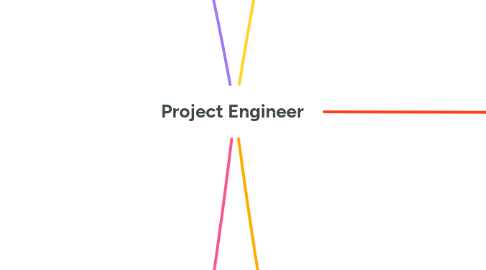Project Engineer
by ADAMS KAHATAPITIYAGE

1. Steps to Become a Project Engineer
1.1. 1. Get a bachelor's degree in engineering management.
1.2. 2. Apply for a job as an entry-level project engineer.
1.3. 3. Get a Professional Engineering license.
1.4. 4. Obtain the Professional in Engineering Management certification.
2. Responsibilities
2.1. Collaborate with Senior Engineers to improve efficiency and maintain profitability.
2.2. Develop equipment specifications for each project.
2.3. Create a framework to monitor project metrics and collect data.
2.4. Formulate realistic parameters for projects, including design and implementation procedures.
2.5. Establish methods for administering field tests and monitoring their quality.
2.6. Ensure compliance with codes, policies, practices, specifications, performance standards, and other aspects of the project.
2.7. Establishing the specifications for the equipment needed for the project.
3. Skills
3.1. Project management
3.2. Project design
3.3. Requirement analysis
3.4. Process improvement
3.5. CAD
3.6. Problem-solving
3.7. Attention to detail
3.8. Math
3.9. Creativity
4. Best Certifications for Project Engineers
4.1. Engineer In Training Certification (EIT)
4.2. OSHA Safety Certificate
4.3. Project Management Professional (PMP)
4.4. Six Sigma Green Belt
4.5. Master Project Manager (MPM)
4.6. AutoCAD Certified Professional
4.7. Structural Engineer (SE)
4.8. Certified Energy Manager (CEM)
4.9. Certified Chemical Engineer (CCE)
4.10. Certified Agile Developer (CAD)
5. Qualifications
5.1. Knowledge: Familiarity with project management tools, software, industry regulations, and standards.
5.2. Education: Bachelor's degree in engineering or related field typically required; some employers prefer a master's degree.
5.3. Licensure: Professional engineering license may be required in certain industries, obtained through exam and meeting requirements.
5.4. Experience: Previous engineering or project management experience generally required, varying with project complexity.
5.5. Training: Specific training in project management or related areas may be required by some employers.
5.6. Certifications: Preferred or required certifications, such as PMP, may be sought by employers.
5.7. Skills: Strong technical skills in engineering, effective communication, leadership, problem-solving, attention to detail, time management, and flexibility.


